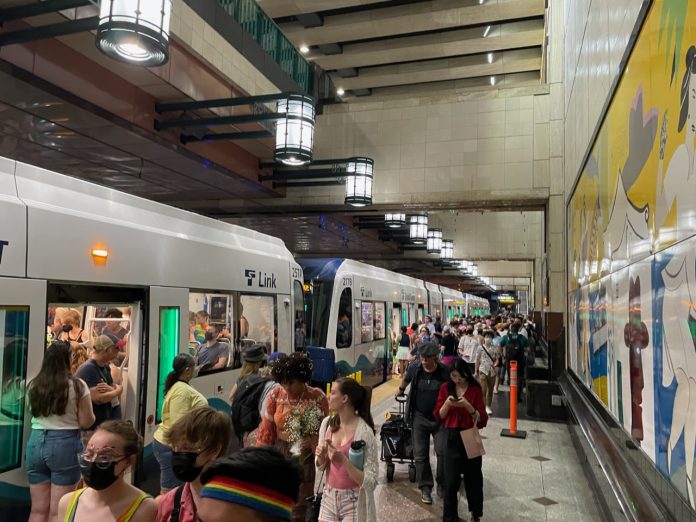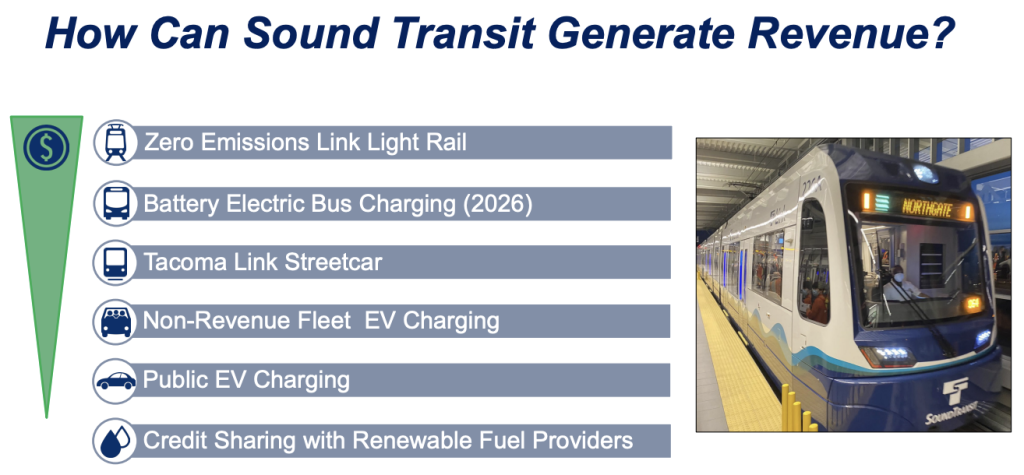
Sound Transit has an opportunity to leverage Washington’s new Clean Fuel Standard for revenue. The agency believes that participation in the market-based program to reduce greenhouse gases from transportation could deliver a revenue-positive outcome. Passed in 2021, the Clean Fuel Standard went into effect this year and applies to fuel producers. By 2034, the Clean Fuel Standard is supposed to reduce the carbon intensity of fuels by 20% using 2017 levels as a baseline.
Transportation has an outsized impact on greenhouse gas emissions in Washington. It ranks as the top source, making up about 45% of state greenhouse gas emissions according to 2018 data. Heating for residential and non-residential uses is second at a much smaller 23%. So tackling the transportation sector first is a climate action priority with the Clean Fuel Standard offering a top shelf strategy to target one angle of the problem.
Generally, fuel producers in Washington are required to participate in the Clean Fuel Standard program. They have several choices in how to meet the law, whether by directly reducing the carbon intensity of their fuels over time, purchasing offset credits, or a combination of the two.
Agencies like Sound Transit can voluntarily participate in the program as well to generate credits to be purchased by fuel producers. This is because Sound Transit has transportation assets that use low carbon and zero emissions vehicles and provide more sustainable transportation services.

Sound Transit has a relatively big portfolio that could generate credits and thereby revenue from the Clean Fuel Standard marketplace. The biggest of these is Link light rail trains, which operate as zero emissions vehicles since they source energy from renewable electricity producers. The system is also rapidly expanding, which will help increase how many credits could be generated from this service type.
Stride bus rapid transit lines are slated to open in the next few years and the agency intends to procure credit qualifying battery-electric buses. Smaller sources could also include the Tacoma T Link streetcar line, the agency’s growing non-revenue service electric vehicle fleet, and public electric vehicle charging facilities at park-and-ride transit centers.
Sound Transit still needs to do number crunching to determine how much revenue might be possible under the Clean Fuel Standard program, but the agency did outline projected revenue from Link light rail. Over the next four years, Sound Transit could gross about $11.8 million ($750,000 in 2023, $1.8 million in 2024, $4.5 million in 2025, and $4.7 million in 2026). These numbers are based on an estimate of $80 per metric ton for a credit using California’s marketplace as a benchmark and using a middle scenario, but that could change once the Washington marketplace is up and running this summer.
Sound Transit could see some additional costs under the Clean Fuel Standard program for diesel. The premium cost could be $0.20 per gallon by 2031 and could mean that the agency would spend $750,000 more because of the program.
Amy Shatzkin, Sound Transit’s sustainability director, suggested that higher fuel costs aren’t a forgone conclusion. “In speaking with transit agencies across California, including LA Metro and BART amongst others, they all have reported that they have not been able to attribute higher fuel costs over the 11-plus years that the program has been running to their state’s [clean fuel standard],” she said. Even if higher fuel costs happen, participation in the program is expected to more than offset added fuel costs.
Stephen is a professional urban planner in Puget Sound with a passion for sustainable, livable, and diverse cities. He is especially interested in how policies, regulations, and programs can promote positive outcomes for communities. With stints in great cities like Bellingham and Cork, Stephen currently lives in Seattle. He primarily covers land use and transportation issues and has been with The Urbanist since 2014.


